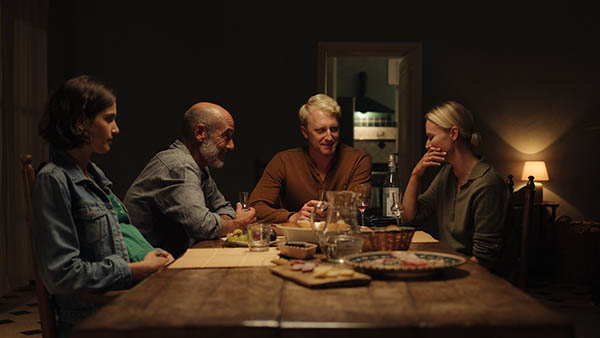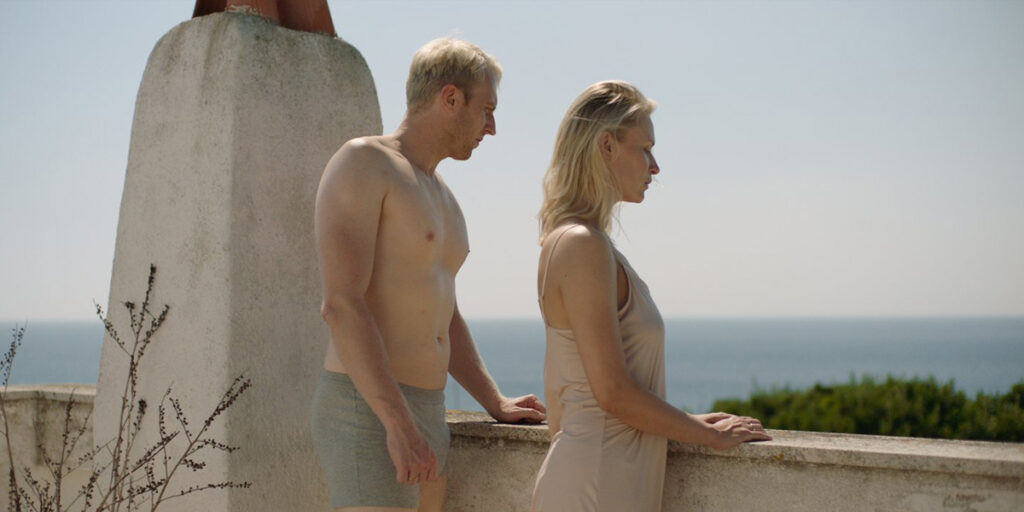Directed with a remarkable sense of style for a debut feature, Silent Land subtly and noiselessly radiates a venomous anxiety all its own.
The most immediately apparent feature of Silent Land, director Aga Woszczyńska’s impressive feature film debut, is its unabashed commitment to silence itself. So impeccably is the film’s sound design woven into the picture’s overtones of class, isolation and anxiety that the absence of noise is wielded as a weapon as shocking as any noisy interjection, with the entire picture resting on a firm bedrock of deeply worrying quiet. Among Sardinia’s heaving natural soundscapes – crashing waves, birdsong and the call of insects – the story plays out primarily through gaps in dialogue and the occasional sharp insertion of disruptive artificial noise, as both sound and its absence create tangible peaks and troughs through which the director is able to work a haunting story of guilt and alienation.
The story plays out over the course of an ill-fated getaway by wealthy Polish couple Adam and Anna, portrayed with a tone-perfect and picturesque iciness by Dobromir Dymecki and Agnieszka Zulewska respectively. Adam and Anna’s meticulously planned trip begins to unravel as soon as they discover that the swimming pool alongside the villa is empty upon arrival, and refusing to accept excuses of water shortages, its repair becomes a thorn in their side that threatens the supposed safety of their isolation. When disaster strikes, the couple are dragged into a confrontation with the local systems that they had tried so actively to shirk: the local town’s populace, a mix of local, tourist and immigrant with none-too-subtle hostility masked by a veneer of Mediterranean hospitality, and a police force that matches a lackadaisical willingness to let things slide with an ominous sense of bureaucratic perfectionism.
However, the (relatively uneventful, when considering the film as a whole) plot is fleshed out much more colourfully by a consistent attention to the tone of its more minor details. Adam and Anna begin to talk their way inescapably towards ruination through the slight changes they make to their retelling of the accident, and one is left with a resonating feeling of watching the couple figuratively dig their own graves. The objective truth of matters is revealed exclusively piecemeal to viewers as well, as we see snippets of CCTV footage interspersed throughout police interviews and dinner table conversations. Insistently, the separation between the couple and the rest of the island is re-iterated through long, silent car journeys and a fixation with a temperamental driveway gate, while in the background a growing, unspecified military presence looms and expands with a sense of ominous inevitability.

All of these details are related with a directorial swagger that shows remarkable promise for a debut feature. Its meticulously calculated puzzle-box nature is artfully crafted to within an inch of the film’s life, and while its slowness may occasionally teeter over the line into mildly tiresome languidness, Woszczynska’s commitment to sharply polished detail pays frequent dividends. Wide open and deserted landscapes are finely captured and composed by cinematographer Bartosz Swiniarski, who transforms the stark sunlight of southern Italy into an instrument of threatening exposure. Even the film’s casting decisions are carefully stylistic: beyond Dymecki and Zulewska’s statuesque rigidity (Woszczyńska herself describes the pair as looking “like Ikea models”), Claudio Bigagli and Jean Marc Barr are particularly striking as, respectively, a melancholic police general and a disconcertingly warm diving instructor.
Barr, in particular, also acts as a microcosmic representation of one of the film’s key repeated motifs. Each character displays subtle changes in attitude and openness as they switch freely and impressively between languages – almost all major figures conversing in some combination of Polish, French, Italian and English – and it is often through stilted and forced conversation that each lets slip the cracks in their well-established disguises. The diving instructors are desperate for cash, willing to take worrying risks with clients’ health and safety; the police are torn asunder by military pressure and the importance of local tourism; the couple themselves are desperate to obscure their own internalised guilt through denial and blame. As each of these figures resist outside pressures on their chosen courses, their increasing desperation exposes core weakness in their psyche that turns their secrecy into its own kind of danger.
Silent Land is far from a free-flowing piece, and is perhaps overly self-confident in its reluctance to move at any pace other than its own. Occasionally, sequences drag on for a length more exhausting than suspenseful, and characters’ reluctance to reach the end of their arcs can result in a frustrating experience for a viewer disinclined to probe the more stubbornly opaque elements of the direction. Nevertheless, even as purely a tonal rather than narrative piece, one is left with a resonant feeling of claustrophobia in open landscapes, disquieting silence in bustling town centres, the inherent paradox of safety within isolation ringing throughout the piece with a long-lasting anxiety, with numerous triumphant sequences and a closing shot that imprints firmly upon the memory. Within the alienation of the tourist, Woszczyńska unravels a story of guilt and hidden ill intent that rings far more universally.
Silent Land will be released in cinemas in the UK on September 23, 2022.

